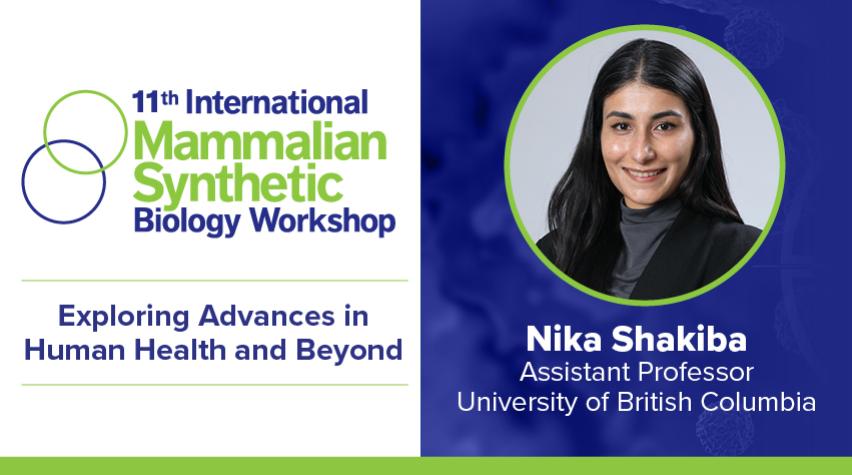
Organized by AIChE’s Society for Biological Engineering (SBE), the 2024 International Mammalian Synthetic Biology Workshop (mSBW) is set for August 6–7 in Boston, Massachusetts. This is the premier meeting on mammalian synthetic biology and its applications, where leaders in synthetic biology join with experts from related fields to explore synthetic biology research — including new technologies with increasing translation into industry and clinical settings. Reserve your spot by June 28 for best rates.
We caught up with mSBW conference speaker Nika Shakiba, Assistant Professor at the University of British Columbia, to discuss what she’ll be presenting at mSBW.
What inspired you to do research in this field?
Synthetic biology challenges us to look at cells as programmable units of life. Through this lens, we can apply engineering design, modeling, and problem-solving principles to predict and control the behavior of cells for biomedical applications. The complexity of mammalian cells presents interesting challenges for doing this, since we don’t yet fully understand the inner workings of these cells. This makes the challenge of mammalian synthetic biology even more interesting, with the potential for game-changing rewards in regenerative medicine and beyond. This is what inspires me to develop and apply synthetic biology tools to program stem cell systems.
How do you envision this field solving some of the challenges in engineering and society?
As we move towards being able to engineer mammalian cells, we unlock possibilities for growing and manufacturing these cells at scale, for applications in regenerative medicine, disease modeling, and drug screening. Once we can derive human cells that are broadly immune compatible at scale, we can make cellular therapies accessible. Using genetic engineering tools, we can explore therapeutic approaches to tackling mono and polygenic diseases. We can also answer basic questions about how our bodies develop, repair, and age.
What advice would you give to students or young professionals thinking about a career in mammalian engineering?
There is so much yet to be known about how mammalian cells and tissues function, and the field of mammalian cell engineering is ripe with fundamental open questions. To push the field forward, there is a need and opportunity to bring different expertise and interests to the table, from engineering, to computational biology, to life science. My advice is to look for questions that capture your curiosity and look at them through the lens of your expertise. Then, seek out interactions with others who share your passion for the same questions to see how they think about the problem. Intersecting and complementing expertise can lead to exciting new ways of reverse and forward engineering mammalian cells.
What is the one big takeaway that you would like audiences to gain from your talk?
Systems and synthetic biology approaches offer the opportunity to unlock the underlying biological rules that govern our cells. In particular, stem cells are an interesting substrate on which to focus our attention, owing to their ability to self-renew and give rise to the various cell types of the body. By coupling in silico and in vitro tools, we can start to unravel complexity. One particular cellular behavior we ought to understand is how mammalian cells, and stem cells in particular, impact one another’s fate. Cell-cell interactions that lead to the competitive elimination of neighboring cells are a relatively new phenomenon that we are just beginning to understand, and synthetic biology tools are key to this endeavor.
About SBE
Established in 2004, the Society for Biological Engineering is a technological community for engineers and applied scientists integrating biology with engineering. Members of SBE come from a broad spectrum of industries and disciplines and share in SBE’s mission of realizing the benefits of bioprocessing, biomedical, and biomolecular applications. Learn more about SBE.


